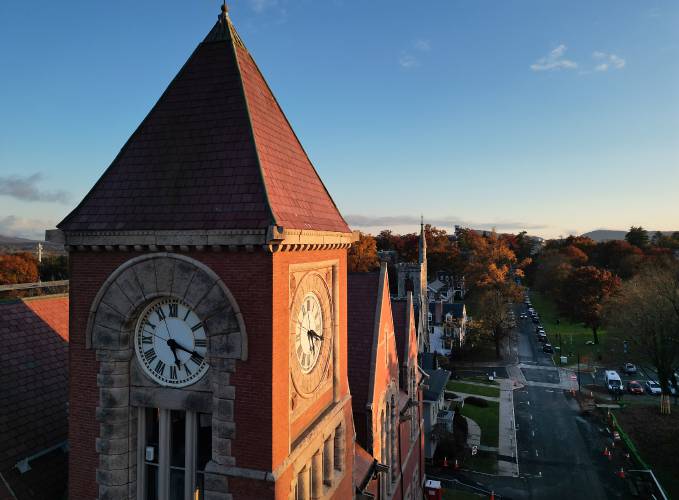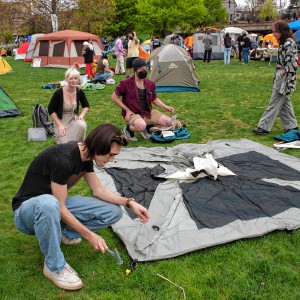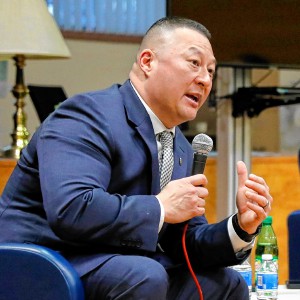State to cover more than one-third of Amherst’s $19M Centennial water treatment plant project

Amherst Town Hall STAFF PHOTO/DAN LITTLE
| Published: 01-01-2024 9:21 PM |
AMHERST — More than one-third of the almost $19 million cost to Amherst for rebuilding the Centennial water treatment plant in Pelham is being covered directly by the state through principal forgiveness on two loans.
Town officials on Thursday announced that Amherst is in line for almost $7 million in principal forgiveness on the loans from the Clean Water Trust, with $6 million already awarded and nearly $1 million more pending.
The Clean Water Trust helps communities build or replace infrastructure that enhances ground and surface water resources, ensures the safety of drinking water and protects public health, through awarding low-interest loans and grants to cities, towns and water utilities through the Massachusetts State Revolving Funds.
“These funds come at a crucial time as we continue to replace critical infrastructure for the town,” Town Manager Paul Bockelman said in a statement. “This work must be done so we can continue to provide an adequate supply of clean drinking water to town residents and our institutional partners well into the future.”
“This significant grant will lessen the cost for the residents and others who depend on the town’s water supply,” he added.
Last winter, the town accepted a low bid of $18.87 million from R.H. White Construction Co. Inc, of Auburn, to do the work on renovating and modernizing the plant that treats drinking water from the Hills and Hawley reservoirs in Pelham. The total cost, though, is around $21.5 million, with other expenses including engineering and contingency. Construction began in May with demolition of the existing facility, with work expected to finish in May 2025.
The plant is using new filtration technology known as dissolved air flotation, improving operations by reducing the amount of disinfection byproducts from the current water treatment process, as well as cutting energy use.T
he water treatment plant had filtered about one million gallons of surface water daily for Amherst, but has been offline in recent years, with the town’s primary water sources being the Atkins Reservoir in Shutesbury, with its water going to a treatment plant in the Cushman section of Amherst, and wells in the Lawrence Swamp in South Amherst, supplying an average of 3 million gallons per day of drinking water to residents and businesses, as well as the Amherst College and Hampshire College campuses, the University of Massachusetts, and parts of Pelham, Belchertown, Leverett and Hadley.
Article continues after...
Yesterday's Most Read Articles
“Having this facility online gives us the resiliency we need to overcome things such as climate change that might impact our water system in the future,” said Amy Rusiecki, the assistant superintendent for the Department if Public Works.
The State Revolving Fund program for clean water and drinking water infrastructure projects, a joint federal and state financing loan program that provides subsidized interest rate loans, is structured as a loan forgiveness program that is intended to make the project more affordable to communities and their rate payers.
The Massachusetts Clean Water Trust awarded a 2023 State Revolving Fund loan of $15 million, with principal forgiveness of $2.97 million that was later increased to $597,000. Additional support for this project is listed on the recently released 2024 draft SRF Intended Use Plans, including an additional $4.93 million loan to the town with principal forgiveness of $976,140. There is a public comment period on the draft Intended Use Plans, which is open through Jan. 31.
Scott Merzbach can be reached at smerzbach@gazettenet.com.

 Area property deed transfers, May 2
Area property deed transfers, May 2 Pro-Palestinian encampment disperses at UMass, but protests continue
Pro-Palestinian encampment disperses at UMass, but protests continue Amherst council confirms Gabriel Ting as police chief
Amherst council confirms Gabriel Ting as police chief Music key to Northampton’s downtown revival: State’s top economic development leader tours city
Music key to Northampton’s downtown revival: State’s top economic development leader tours city 
